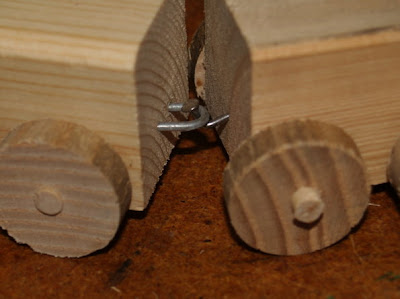 Today in the CSS woodshop my first, second and third grade students continued making their trains. This is a nice project, in that it is large enough that the students see clearly that it can't be done and taken home in a single class, and they are excited about the results. We use a simple method to connect the cars to each other using a bent nail and a wire fencing staple.
Today in the CSS woodshop my first, second and third grade students continued making their trains. This is a nice project, in that it is large enough that the students see clearly that it can't be done and taken home in a single class, and they are excited about the results. We use a simple method to connect the cars to each other using a bent nail and a wire fencing staple.

I want to talk just a bit about assessment and the role that the arts can play in bringing assessment out of the domination of standardized testing expertise and into the hands of the lay scientist... the parent wanting to see results and the greatest growth opportunities for his or her child.
Most standardized testing necessarily has to do with things that can be measured by a battery of questions having approved right and wrong answers. Even the essay portion of the SAT has to do with the following the rules of proper and effective writing.
And so, let's look at what corporations say they want in someone they hire. They want: creative problem solving, teamwork, and demonstrated responsibility. A schooling built on the basis of what we can most easily measure through standardized testing does not deliver on any of these three things.
I want to go back for just a moment to some earlier posts about David Henry Feldman's essay, The Child as Craftsman. I have been granted permission by the author to distribute it to interested scholars, so will send it to you if you make a request for it via email.
In the Child as Craftsman, Feldman offers three metaphors for schooling. I will grossly simplify: One the child is an empty vessel to be filled to his or her capacity by the nearly all knowing teacher. The second metaphor is related to Pavlov's and Skinner's work on environmental conditioning, and offers that learning is "a function of the environmental arrangements that a good teacher is able to make." The third metaphor is one derived from Piaget and other developmental psychologists, that the child goes through universal stages of development, and that these are natural and sequential for all children. Feldman uses A.S. Neill mentioned in yesterday's post as an example of an educator taking the Piaget metaphor to the extreme.
Feldman offers a "new metaphor," that of the child as craftsman, and simultaneously points us toward a different way of assessing performance and learning success.
He proposes "twin signs of progress toward a fruitful education for the future... 1) an increasing number of individuals engaged in and committed to pursuit of mastery of their field and 2) the number of novel, unprecedented, or unique contributions that occur in these fields." The interesting thing here, is that you don't have to be an educational expert, trained in statistics to walk into a classroom and observe whether or not it is fulfilling its mission. Assessment by the arts is the only way to measure the three things that American employers want schools to produce.
It is interesting that a trained and experienced educator CAN walk in to a classroom and quickly see its effectiveness. He or she will see students seriously engaged (or not). He will see students working effectively in teams (or not) and he or she will see evidence of creative problem solving in the form of projects at varying levels of completion (or not). A parent visiting the class can witness exactly the same thing, and has the additional opportunity of seeing the child's enthusiasm each morning as they prepare for school.
"What the best and wisest parent wants for his own child, that must the community want for all of its children. Any other ideal for our schools is narrow and unlovely; acted upon it destroys our democracy." - John DeweyThe new movie, Waiting for Superman was produced by Davis Guggenheim who would drive by 3 public schools on his way each morning to take his children to private school and felt a sense of guilt that he was unable to give the best quality education to others as well. I am looking forward to seeing the movie, as I suspect that Guggenheim was inspired by what John Dewey knew to be true. School should not be contrived but should be made authentic and true for each child.
Craftsmanship (and the arts) is the essential metaphor for the new education, not because it provides an alternate means to assess, but because it is really how we learn, how we grow, and how we become engaged passionately with the future.
On another subject the poll at right was interesting. Thank you all for taking time to participate. Just under half my readers were interested in woodworking. Just under half found my writing strangely entertaining. A full 91 percent were here for the philosophy of hands-on learning. I feel complimented by each response. Make, fix, do. There is growth and pleasure in the whole thing.
"...corporations... want: creative problem solving, teamwork, and demonstrated responsibility..."
ReplyDeleteSo not only do corporations want these traits for office-type work, there is also a huge shortage of machinists, welders, mechanics and yes, woodworkers.
Mario